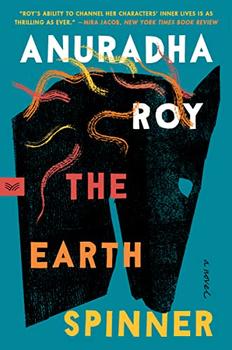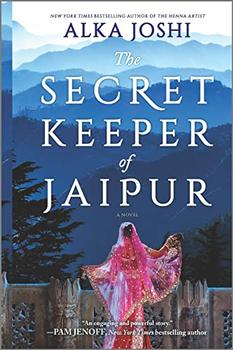Summary | Excerpt | Reading Guide | Reviews | Beyond the book | Read-Alikes | Genres & Themes | Author Bio

This substantial, character-driven debut novel invites readers to travel to places beyond roads. Its adventurous coming-of-age story follows first-person narrator Shalini on a quest to escape grief and to excavate family secrets, navigating between privilege and poverty, knowledge and self-doubt. Madhuri Vijay's prose is lyrical, descriptive and seasoned with terms from the Indian subcontinent, a region alive with diverse religious, cultural and linguistic currents.
"The shops were open now, some owned by Muslims, others by Hindus who had lit sticks of incense in front of tinseled portraits of Lakshmi. The ground was littered with fruit rinds, plastic cups, pellets of goat shit, and runnels of brown water."
At age 8, Shalini witnessed something spark between her mother and a visiting Kashmiri sari salesman, Bashir Ahmed. Bashir was more than a salesman, he was a gifted storyteller, and entertained mother and daughter with dazzling tales, personal style, and flashing green eyes. Curious from the beginning, Shalini later noticed that her mother relied on Bashir in ways beyond a simple housewife listening to a visiting salesman. We meet Shalini in 2010 when she is 30, and reflecting back on her journey to Kashmir four years earlier. In the aftermath of her mother's death, on the run from grief, post-college job responsibilities, and a wealthy slacker boyfriend, Shalini is determined to find Bashir in Kashmir to let him know that her mother is dead. Traveling by taxi, train and on foot, the journey from Bangalore spans nearly 1900 miles, from urban affluence to subsistence village life in the Himalayan foothills.
"I stopped and raised my face to the mountains. They were pink, shadows running like deep cracks down their slopes. I lifted my hand and traced their wavering peaks with a forefinger. Somewhere in those mountains, I sternly reminded myself, was Bashir Ahmed. That was why I had come. To find him."
There are many flashbacks, woven seamlessly and cinematically through the main narrative. The twists of past and present enhance tension and deepen all characters. Shalini recalls a complex and unstable childhood relationship with her mother, Amma. Shalini's parents were in many ways mismatched, yet joined by a traditional, arranged marriage. Amma, an alluring beauty, was a rural village girl with limited formal education. Shalini's father, Appa, attended university in the U.S. and owns a multinational business headquartered in affluent Bangalore. Shalini embodies elements of both parents, but during her trip to Kashmir, she begins to notice more similarities between herself and her volatile, unpredictable mother. In her earlier years, Shalini enjoyed a stronger bond with her father. Appa is a nurturing presence, a financial provider and an intellectually challenging friend. It's clear that Shalini is not expected to accept an arranged marriage, she is of a new generation, where previous rules no longer apply.
Upon first arriving in Kashmir, Shalini learns that Bashir has disappeared - one of many political dissidents who have been imprisoned, killed, or otherwise detained without recourse by the occupying Indian military forces. The Indian state of Jammu and Kashmir is claimed by both Pakistan and India, with many Kashmiri separatists wanting a sovereign state. (Political crosscurrents are carefully explored throughout the novel.) Shalini is eventually sheltered by Bashir's son, Riyaz Ahmed, and his effervescent wife Amina, who teaches her to milk cows and other survival skills, and nicknames her "Murgi" which means "chicken," as in "always running away."
Life in a rural Kashmiri village seems idyllic to Shalini at first, as she's befriending lovely people and admiring majestic natural scenery, especially in contrast to the cacophony of urban Bangalore. Soon, however, she notices that lack of access to basic medical care or education, and ever-present political disruptions mean that life in Kashmir is far from a Shangri-La utopia. People here are one injury away from starvation, one misspoken word away from detainment or death. She tutors the head of the village council's daughter, who aspires to learn enough English to enroll in a university. She's offered a position to teach at the local school, and considers staying, but the destabilization of both the region and her own life complicate this prospect.
Shalini steps into many frightening situations, which she navigates with unpredictable levels of confidence. She is often naive, making impulsive, dangerous choices, including instigating imprudent romantic encounters. Her actions (or failure to take action) cause hardship and danger for others. This is a reckoning that, as Shalini matures, haunts her. The Far Field exemplifies the power of story on many levels - to hold information, history and deep currents of emotion. Yet life is not like one of Bashir's fairy tales. Easy answers and absolute redemption remain elusive.
The novel offers elements of travelogue with the tone of a personal journal, where the narrator's emotions and ideas reveal insecurities and the intricacies of her consciousness without self-censorship. Intimate sensory details and emotional resonance flow on almost every page.
"There had been no mirror in the house in the village, and this was the first time in weeks that I had looked at myself. I felt a brief shock of recognition, followed by an obscure disappointment. I was thinner, yes, my hair a bit longer, but other than that, I had not changed at all. But, then, what had I expected? A manic, holy gleam in my eye, as in the eyes of those ragged, hippie Westerners I sometimes saw around Bangalore...consecrated by their first exposure to yoga and the poor?"
On an important level, this book bears witness to complicated political injustices and territorial disputes in contemporary Jammu and Kashmir. It also portrays the heroic quest of a flawed and enduring heroine seeking her purpose in a difficult world. Raw edges of personal and cultural loss reverberate long after the last page is turned.
Readers interested in the current political situation in Jammu and Kashmir can find more information here.
![]() This review was originally published in The BookBrowse Review in January 2019, and has been updated for the
December 2019 edition.
Click here to go to this issue.
This review was originally published in The BookBrowse Review in January 2019, and has been updated for the
December 2019 edition.
Click here to go to this issue.

If you liked The Far Field, try these:

by Anuradha Roy
Published 2023
From the critically acclaimed, Booker Prize-nominated author of Sleeping on Jupiter and All the Lives We Never Lived, an incisive and moving novel about the struggle for creative achievement in a world consumed by growing fanaticism and political upheaval.

by Alka Joshi
Published 2022
In New York Times bestselling author Alka Joshi's intriguing new novel, henna artist Lakshmi arranges for her protégé, Malik, to intern at the Jaipur Palace in this tale rich in character, atmosphere, and lavish storytelling.
People who bite the hand that feeds them usually lick the boot that kicks them
Click Here to find out who said this, as well as discovering other famous literary quotes!
Your guide toexceptional books
BookBrowse seeks out and recommends the best in contemporary fiction and nonfiction—books that not only engage and entertain but also deepen our understanding of ourselves and the world around us.